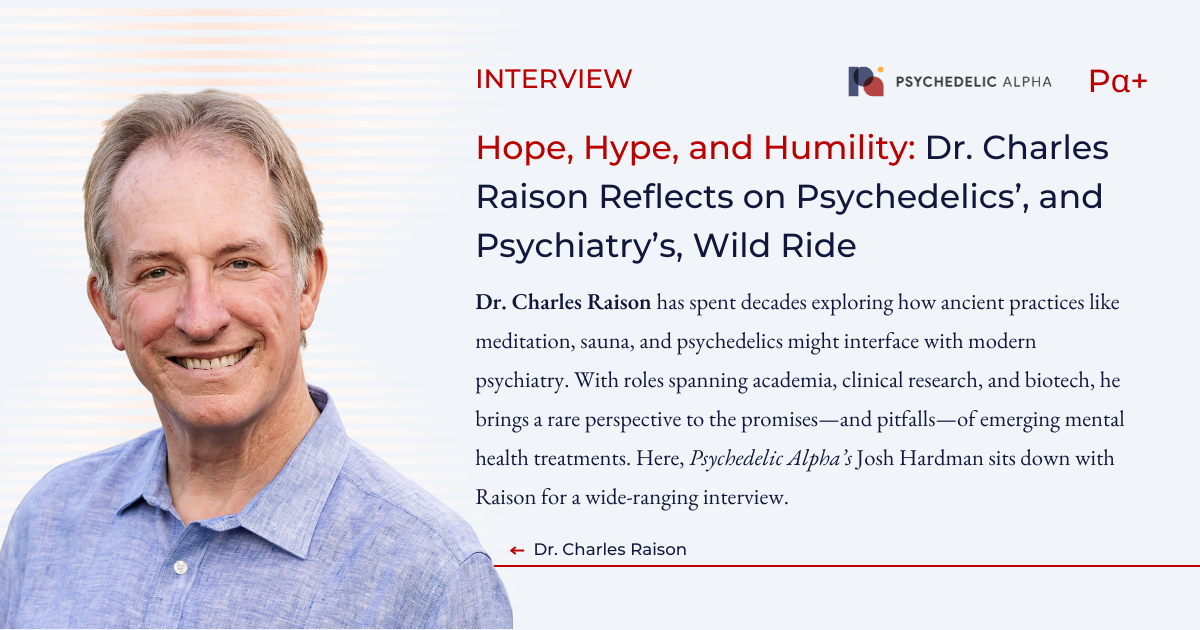Dr. Charles Raison has long held an interest in melding ancient practices with today’s mental health system, looking at how things like meditation and psychedelics might interface with modern psychiatry.
Raison, who often goes by Chuck, holds various positions across academia and industry, such as Professor of Psychiatry and Human Ecology at UW Madison, Director of the Vail Behavioral Health Innovation Center in Colorado, and Director of Clinical and Translational Research at Usona Institute, and Director of Research on Spiritual Health at Emory University.
An aficionado of the hype cycle—and, for that matter, the post-hype comedown—associated with promising new mental health treatments, Raison is perhaps uniquely positioned to weigh in on the current state and future prospects of psychedelics in mainstream psychiatry.
And so, for our latest Pα+ interview, Psychedelic Alpha Editor Josh Hardman sat down with Raison for a wide-ranging discussion…
***
In this Interview
- Inspired by Ancient Practices
- Caricatures: How Psychedelic Trials Expose
- Psychopharmacology Research Flaws
- Measuring Meaning
- Access, Scalability, Reimbursement
- Neuroplastogens, Role of the Conscious Experience
- Hype, Awe and Ketamine
- Psychedelic Politics and Silicon Valley on Psychedelics
- Mainstream Psychiatry’s Perspective
- Raison et al.’s Research Agenda
***
<
Inspired by Ancient Practices
Josh Hardman, Psychedelic Alpha: So, Chuck, I know you have been interested in things like heat therapies, darkness retreats, and so on. Do you have a proclivity for getting interested in popular (or, faddish!) modalities, or are you just at the cutting edge?!
Dr. Charles (Chuck) Raison: There was an old Woody Allen movie, Zelig. The concept of the movie was that this guy was kind of an idiot who just accidentally happened to wander through the primary moments of the 20th century. They would splice him into reels with Hitler, FDR, Martin Luther King giving his speech about a dream. I feel like Zelig… I’ve wandered through all sorts of things, too!
But in this case, no, I have been interested in this stuff for years, and I got into psychedelics because I had this interest in spirituality and mind-body stuff, what it means to be conscious, how the body influences the mind. All this stuff that is cliché now, and all over TikTok!
My work has really been a lot about ancient practices, these sort of low-hanging fruit that humans repeatedly stumbled upon across history, maybe even prehistory; things they could do that would have an immediate effect on their perception, their emotions, that tended to induce pro-sociality, elevated states of mind. Unlike Prozac, where you may need to take it for a couple of weeks to notice something, in these cases it’s fairly quick: people do a sauna and they come out of it feeling elevated and sort of enlivened, right? So, the argument is that people rediscover these things over and over again.
They’ve been taken up by religions, which was often the first place they landed. But they may also have promise as depression treatments or well being treatments in the modern world. Can we retrofit them into modernity?
And so, other than the more basic work that I did looking at inflammation in the brain and depression, really all my clinical work has been around these things. We did meditation, then we did hyperthermia, then I had an opportunity to get into psychedelics. These are three paradigmatic, widely-used ancient practices.
So, there is a method to the madness! And dark retreats are another example of a more extreme ancient practice that I’m looking at, too.
Caricatures: How Psychedelic Trials Expose Psychopharmacology Research Flaws
Hardman: Part of attempting to retrofit these ancient practices into modernity is presumably an attempt to fit them into the clinical trial framework. That has been challenging with at least one of those practices, psychedelics. In that sense, I like to think of psychedelics as generators of caricatures, in many respects. When you have a psychedelic experience, for example, you might sense a caricature-like version of yourself, or something that you haven’t confronted adequately… or that you have felt chronically, and now you’re feeling it acutely. But I also think, having spoken to researchers like yourself as well as regulators and drug developers, that the issues they face when they are straitjacketed into the clinical trial paradigm are caricatures—more dramatic versions—of issues that we see in other areas of psychiatry research. Things like functional unblinding and the role of participant expectation, for example.
Raison: I think about this a great deal, as you might imagine, but you said something that I think is underappreciated.
Psychedelics, because of some of their unique characteristics, are exposing some of the emperor’s new clothes with regard to mental health and pharmacologic trials in general, with functional unblinding being a classic example.
The idea of a placebo-controlled trial is that people don’t know whether they’re getting the active medicine or the placebo, so that you control for hope, expectancy, therapeutic relationship, all these contextual factors. But of course, if people can guess the treatment allocation, then this is functional unblinding, and it is a real problem…
Sign-in or join Pα+ to continue reading this Issue of the Psychedelic interview…
Join Pα+ Today
Independent data-driven reporting, analysis and commentary on the psychedelics space: from business and drug development through to policy reform and culture.
Already a member? Log In
✓ Regular Bulletins covering key topics and trends in the psychedelics space
✓ Regular articles and deep dives across psychedelic research, policy and business
✓ Interviews with insiders
✓ Monthly interactive database and commentary on psychedelic patents
✓ Quick-take analysis of major developments
✓ A Library of primers and explainers
✓ Access to our full back catalogue


